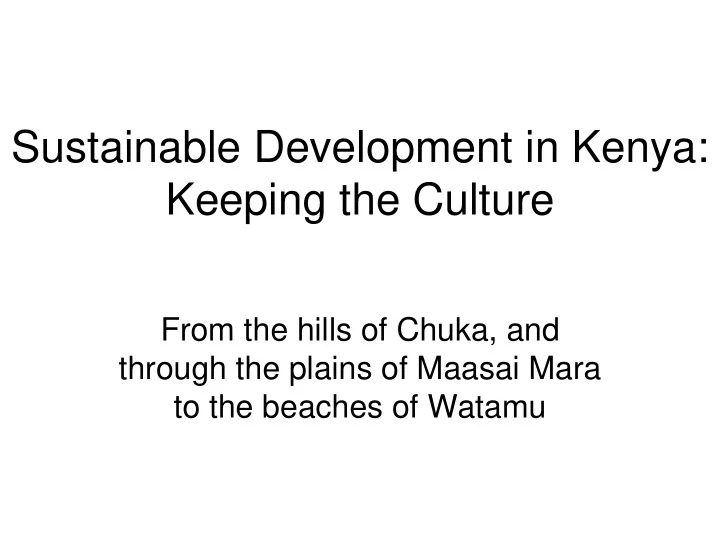

Sustainable Development in Kenya: Keeping the Culture From the hills of Chuka, and through the plains of Maasai Mara to the beaches of Watamu
What are Sustainable Development and Culture? • Sustainable development is “development that meets the needs of the present without compromising the ability of future generations to meet their own needs.” (worldbank.org) • Culture is “the customary beliefs, social forms, and material traits of a racial, religious, or social group” as well as “the characteristic features of everyday existence shared by people in a place or time.” (merriam-webster.com)
Worldbank.org Sustainable Development Puzzle
Exhibit A: Chuka
The Chuka People • People are of Bantu, Gikuyu-Kamba origin • Historically agriculturalist • Wicked dancers! Mayeli Hensley 2012
Issues facing Chuka • Colonization – Monoculture of tea • Deforestation - Land erosion - Water shortages
Chuka’s Sustainable Development • Taking control over their land again through: Forest regeneration Kitchen gardens
Income Generating Activities • Making money to support education and improved lifestyles Beekeeping Fish farms
Impacts on Culture in Chuka • Increased sense of worth • Increased wealth • Increased rates of education • The people are happy! ☺ Mayeli Hensley 2012
Moving on from Idealist Chuka • Sustainable Development is generally focused on ecotourism – Tourism represents 20-30% of GDP in 2004- 2006 (Nelson 2007) • Ecotourism hotspots in Kenya – Game reserves - Maasai Mara – Coastal towns - Watamu
Brenda Lemay 2012 Exhibit B: Maasai Mara
The Maasai people • Most well known tribe in Kenya • Historically pastoralist • Wicked jumpers! Terri Hurlbut 2012
Issues facing the Maasai • Loss of land to game reserves – Overgrazing – Livestock loss – Water scarcity • Pressure for cultivation
Sustainable Development in Maasai Mara • Development here takes the form of sustainable tourism efforts • Conservation of natural resources – At the expense of Maasai land • Ecotourism camps – Many employees are not Maasai themselves
Impacts on Maasai Culture • The Maasai people are losing: – Pastoralism – Land to conservation efforts and game reserves – Livestock to diminished grazing opportunities • The Maasai people are gaining: – Entrepreneurialism (Okech 2007) – Money to cover education costs
Exhibit C: Watamu
The People of Watamu • People are primarily Giriama • Historically traders, agriculturalist, and pastoralist • Long affected by tourism Corbisimages.com
Issues facing Watamu • Tourism – Hotels – Fishing – Mangrove destruction • Community education Watamu Marine Association www.watamu.biz
Sustainable Development in Watamu • Watamu Marine Association programs: – Eliminating new beach projects – Sustainable fisheries program – Community and marine conservation – Community waste management – Community education • ST-EP Program – Sustainable Tourism for Elimination of Poverty
Impacts on Giriama Culture • Culture was changed long ago – Intermarriage and Westernization • Pros: Money, clothes, technology • Cons: Drugs, price inflation, demand for prostitution, children lose interest in school • Begin anew? – Reduction in poverty Toonpool.com
So what does this all mean? • Cultures across Kenya are as different as the landscapes • Chuka – maintaining and reclaiming land • Maasai – shifting culture accordingly • Giriama – almost entirely eradicated • In the midst of enormous environmental changes • Sustainable development is by definition a westernized concept – Do they have a choice other than adapting?
Do we care? • “We are all Africa” - Shakira cameroon.setac.eu
Thank you! • First and foremost, thank you to Jim and Buck for taking me to Kenya. It was a trip of a lifetime and I certainly intend to return!
Thank you! • Thanks to Jacque for teaching me some Swahili – such a blessing! • Thanks to Isaac Mbugua, our driver to Maasai Mara and my friend, for answering all my questions and expanding my Swahili vocabulary. • Thanks to Richie Thuku, our driver to Samburu and Watamu, for his friendship, the laughs and also for expanding my Swahili vocabulary.
Thank you! •Thanks to Fara - my beach boy tour guide, Kalahari dance partner and friend in Watamu for teaching me about local culture and about life in general. •Na rafiki zangu ya darasa – Maisha mrefu na nakupenda kwa maisha! Viaggiscoop.it
Recommend
More recommend